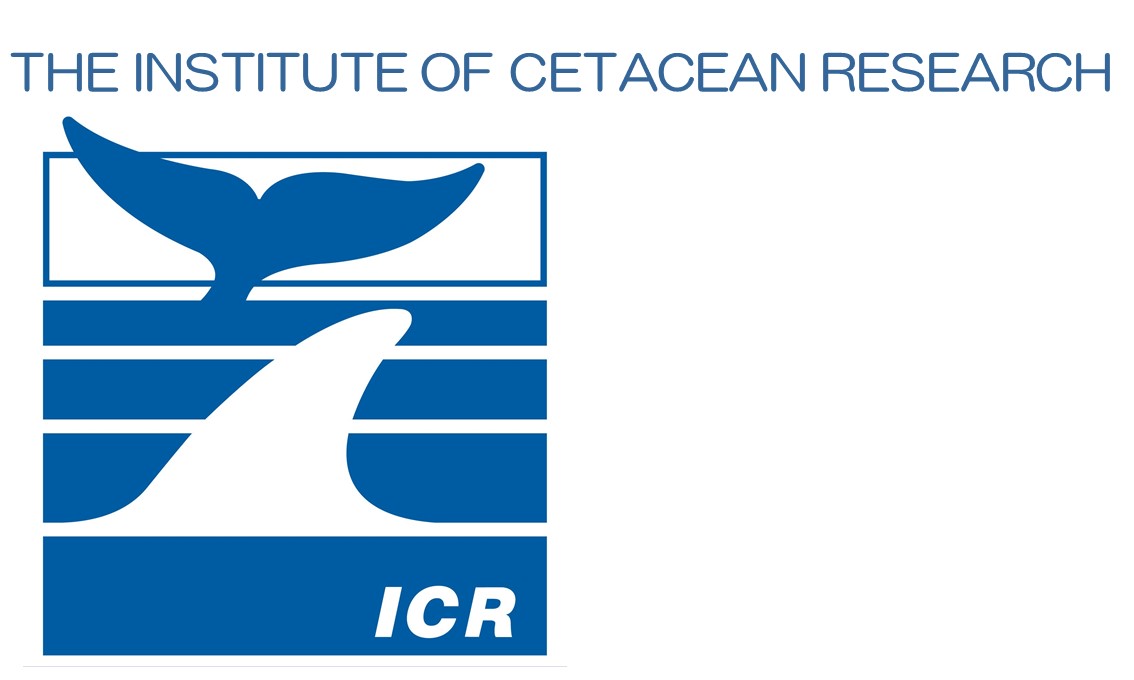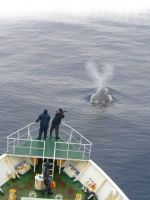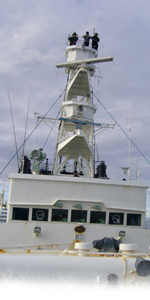- You are here:
- Home>
- English Sitemap>
- Media>
- Media release>
- Japan's Whale Research Program in the Antarctic
Japan's Whale Research Program in the Antarctic
7th December 2001
The Institute of Cetacean Research
On November 6, 2001, Japan's whale research fleet departed for the Antarctic to begin the 15th year of its research program. The research program involves both a sighting survey whose primary purpose is the estimation of trends in abundance, and a sampling component.
Legal Basis for Japan's whale research in the Antarctic
Article VIII of the 1946 International Convention for the Regulation of Whaling (ICRW) unequivocally provides that Contracting Parties may grant permits authorizing the take of whales for purposes of scientific research. This provision begins with the words "Notwithstanding anything contained in the Convention...". Article VIII also provides that the taking and treatment of whales in accordance with this Article shall be subject only to conditions as the Contracting Government sees fit and shall be exempt from the operation of the Convention. Further, Article VIII requires that "any whales taken under these special permits shall so far as practicable be processed and the proceeds shall be dealt with in accordance with directions issued by the Government by which the permit was granted". This means that the Convention requires the utilization of meat and other by-products of the research. Japan's whale research program in the Antarctic is perfectly legal and fully consistent with these provisions of the ICRW and its rights as a signatory to this Convention.
Nothing in the United Nations Convention on the Law of the Sea (UNCLOS) detracts from the rights of States under the ICRW. The UNCLOS obliges States to "work through the appropriate international organizations" for the conservation, management and study of cetaceans. This obligation is clearly met since Japan's research program is conducted in accordance with the terms of the ICRW and supported by the IWC's Scientific Committee. The Government of Japan continues to work through the IWC in an effort to bring the work of the Commission in line with the objectives and purposes of the ICRW.
Scientific Basis for Japan's whale research in the Antarctic
The issue of scientific research on whales is of vital importance to the IWC since the Convention prescribes that regulations adopted by the Commission shall be based on scientific findings. Japan's research program in the Antarctic, which began with feasibility studies in 1987/88 and 1988/89 in response to claims of uncertainty of scientific information, has 4 objectives: 1). Estimation of biological parameters to improve the stock management of the Southern Hemisphere minke whale, 2). Elucidation of the role of whales in the Antarctic marine ecosystem, 3). Elucidation of the effect of environmental changes on cetaceans and, 4). Elucidation of the stock structure of the Southern Hemisphere minke whales to improve stock management. Sampling will include the take of up to 440 minke whales from an abundant stock. The small take for research purposes does not pose any risk to the status of minke whales. More than 100 data items and samples are taken from each whale including ear plugs for age determination studies, reproductive organs for examination of maturation, reproductive cycles and reproductive rates, stomachs for analysis of food consumption and blubber thickness as a measure of condition.
Japan's research program in the Antarctic has included participation by foreign scientists and has been the subject of extensive review by the IWC's Scientific Committee. The Scientific Committee has noted that the program has provided considerable data which could be directly relevant for management and that the results of this program have the potential to improve the management of minke whales. The Scientific Committee has also noted that non-lethal means to obtain some of this information are unlikely to be successful in the Antarctic. The meaning of this advice is unambiguous, however, it has been misrepresented in a number of resolutions adopted by the IWC's Plenary sessions. These resolutions, adopted for political reasons and without scientific basis, urge Japan to refrain from issuing special permits for taking whales. The Government of Japan has rejected these resolutions since they are an infringement on its fundamental rights as a signatory government to the 1946 Convention and because they contradict the findings of the IWC Scientific Committee which has commended both the quality and quantity of the results from this research program. Clearly, if we are to base the management of whale resources on scientific findings, as required by the ICRW, the conclusions of the Scientific Committee argue strongly for continuation of this research program.
The estimate for Southern Hemisphere minke whale population size agreed to by the IWC's Scientific Committee in 1990 was based on survey data from 1982/83 to 1989/90. This estimate was 760,000 animals. It is 10 years since that estimate was made and the Scientific Committee has now said that it its unable to provide reliable estimates of current minke whale abundance. We should not be surprised that over a period of 10 years, populations of individual species within a dynamic ecosystem may change. If new estimates are somewhat lower, it could be a natural consequence of a fast growing resource over-shooting and then returning to a new carrying capacity that reflects an increase in the population of other whale species. Whatever the new estimate may be, even if it were substantially lower than 760,000, it is clear that the population is abundant and in no way threatened by the small research take of 440 animals. In fact, much of the scientific data that the IWC's Scientific Committee will use to make its new population assessment will come from Japan's research program.
Much has been learned from Japan's whale research programs including valuable information related to genetic make-up, reproduction and geographical distribution and the feeding habits of whales. The research has found for example that whales are consuming 3 to 5 times the amount of marine living resources as are caught for human consumption. This is an important issue for world food security. Our research has also showed that contaminant levels in Antarctic minke whales are very low.
The IWC's Southern Ocean Sanctuary
Contrary to the principle that the management of living resources should be based on scientific findings, the Southern Ocean Sanctuary prohibits the commercial taking of whales "irrespective of the conservation status of baleen and toothed whales in this Sanctuary".
The Sanctuary was adopted in 1994 in the absence of advice from the Scientific Committee that such measure was necessary to carry out the objectives and purposes of the ICRW and to provide for the conservation, development and optimum utilization of whale resources. This action by the Commission ignored Article V 2. of the ICRW which requires that regulations "shall be such as are necessary to carry out the objectives and purposes of this Convention...", "shall be based on scientific findings..." and "shall take into consideration the interests of the consumers of whale products and the whaling industry." It also ignored the fact that the area encompassed by the Southern Ocean Sanctuary has the world's largest population of whales and that this represents a valuable food resource for humans. The Government of Japan is committed to the principle that the management of whales, and all marine resources, should be based on scientific findings.
Further, the IWC has been provided with a comprehensive legal analysis related to the designation of the Southern Ocean Sanctuary which concludes that the IWC exceeded its authority under the Convention and that the establishment of the Southern Ocean Sanctuary violates the treaty. Notwithstanding this, the Southern Ocean Sanctuary applies to commercial whaling. It does not apply to the taking of whales for research purposes.
Whales as food and Japanese culture
The Japanese have been eating whale meat and utilizing whalebones, blubber and oil for more than two thousand years. Active hunting for large cetaceans has a history of more than 400 years. Offshore whaling activities began after the Meiji Restoration in 1868, however some whaling remained within the traditional areas where it still plays an important role as the basis of solidarity in the community. In the years immediately following World War II (1947-1949) the consumption of whale meat was about 45% of the total meat consumption in Japan after which it remained at about 30%. However, since the 1960's the supply of whale meat has gradually declined and accordingly consumption has been reduced. The significance of whale meat in Japanese dietary habits, however is still very important at present.
Japanese dietary habits which have been deeply rooted in history show that whale meat has been a protein source as ordinary everyday food but it also has been treated as a special food with regional and social significance. In the areas where whaling has been conducted traditionally, these dietary habits have become an integral part of the community such that all local ceremonies or festivities include the serving of some whale meat dishes.
The whale to the Japanese in ancient times was a kind of fish that was thought to be brave and great. Today, along with all other marine resources, whales continue to be viewed as a source of food to be used sustainably. The total protection of all whales irrespective of their stock status as promoted by some members of the IWC and some environmental and animal welfare organizations is contradictory to Japanese cultural values where whale meat is still eaten and where whales are still revered through religious ceremonies and festivals. This is particularly so for those communities where the local peoples lives have depended on whaling activities.
In December 1995, ninety-five States agreed to a Declaration and Plan of Action on the occasion of the International Conference on the Sustainable Contribution of Fisheries to Food Security hosted by the Government of Japan with technical assistance from the Food and Agriculture Organization of the United Nations. Among other things, the Declaration specifically "Call(s) for an increase in the respect and understanding of social, economic and cultural differences among States and regions in the use of living resources, especially cultural diversity in dietary habits, consistent with management objectives". Sustainable whaling and the consumption of whale meat in Japan is fully consistent with this Declaration. The principles of sustainable use of resources and respect for cultural diversity are accepted as a standard world-wide and are a prerequisite to cooperation in the international management of ocean resources. The position of those opposed to whaling, irrespective of the status of stocks, is contrary to these widely accepted principles which have now been enshrined in numerous international agreements, covenants and other documents.
Conclusions
Criticism that Japan's whale research program in the Antarctic undermines the intent of the IWC's Southern Ocean Sanctuary and the moratorium on commercial whaling, that information sought from the research program is unnecessary or that it can be obtained using non-lethal means misrepresent the facts and are contrary to scientific advice as explained above. Similarly, comments that Japan is breaking international law or that its research program is illegal because of its obligations under the United Nations Convention on the Law of the Sea (UNCLOS) are a misrepresentation of fact. Opposition to Japan's research program in the Antarctic and the consumption of whale meat in Japan also disregards the need for respect and understanding of cultural differences among States. It is important to note that opposition to Japan's research program in the Antarctic is by no means a reflection of widespread opinion. In fact, opposition to this research comes from only a small number of countries where special interest NGOs have had a major influence on government policy related to whales and whaling.




